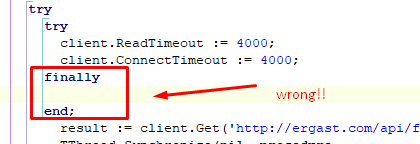Please create a new FMX application, add a button and a memo to run this example. I have this code:
procedure TForm1.Button1Click(Sender: TObject);
begin
TTask.Run(procedure
var
client: TIdHTTP;
result: string;
begin
client := TIdHTTP.Create(nil);
try
try
client.ReadTimeout := 4000;
client.ConnectTimeout := 4000;
result := client.Get('a valid url here just as test');
TThread.Synchronize(nil, procedure
begin
Memo1.Lines.Add(result);
end);
except
on E: Exception do
begin
TThread.Synchronize(nil, procedure
begin
Memo1.Lines.Add(E.Message);
end);
end
end;
finally
client.Free;
end;
end);
end;
It works as I expect but the problem is in the IDE. If I place the cursor somewhere in the body of the anonymous function, I get the closing of the finally statement automatically.
How can I fix this?
First I am here
Then I press enter and I have this!
If you put the cursor at the beginning and not at the end of the line, you can add new spaces without the completion. How to solve this problem? Well, I have discovered that the issue happens because there is this code:
TThread.Synchronize(nil, procedure
begin
Memo1.Lines.Add(result);
end);
If you remove this code, the issue doens't happen anymore. Is this a bug in the IDE?



endto be inserted. (So, if I press Return five times, I get fiveend.) It is driving me crazy. I haven't seen this behaviour in previous Delphi versions. – Potheadenterwithin that synchronization, it would continuously addend;for everyenterpressed. – Squarerigger